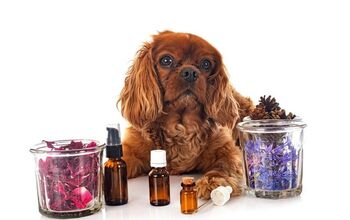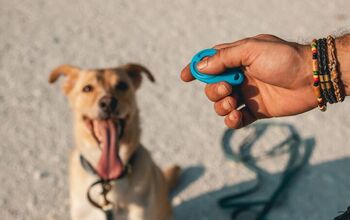What Supplements Should I Give My Puppy?

If you’re bringing a puppy home, it’s natural to want her to get the best start in life. As long as you’re feeding a premium, high-quality dog food, she won’t necessarily need any additional supplements in her diet. That said, there are numerous dog-suitable supplements available that many dog owners swear by, so if you feel better giving your pup supplements then you should go ahead and do so. The only thing to be careful of is correct dosage, as some supplements can have detrimental effects in high quantities. If you’re unsure how much of a supplement you should be feeding your puppy, consult her veterinarian for advice. These are just some of the supplements that may be beneficial for your precious pup.
Essential Fatty Acids
Essential fatty acids (EFAs), such as omega-3 and -6, are found in a number of supplements, most commonly fish oil, hemp oil and coconut oil. While the benefits of EFAs haven’t been definitively proven, some studies suggest that they may promote a healthy heart in canines. They’re also known to be good for encouraging healthy skin and fur.
Related: New Puppy Checklist
Probiotics and Digestive Enzymes
Both probiotics and digestive enzymes promote healthy gut flora and good digestion in general. These are the kinds of supplements that aren’t important to feed every day, but perhaps on a weekly or monthly basis to give a boost to the good bacteria in your pup’s digestive system. That said, if your puppy has a sensitive stomach or suffers from frequent digestive troubles, such as diarrhea, then feeding these kinds of supplements on a more regular basis may be beneficial. However, it’s important to note that if your dog does have chronic digestive issues, you should first rule out any underlying medical issues with her vet.
Related: Top 10 Natural Supplements For Dogs
Brewer’s Yeast
Brewer’s yeast is another common supplement for dogs, which is also safe for puppies to consume. Since it’s full of B-vitamins and contains a range of other vitamins and minerals, it promotes general good health. A lot of dog owners believe that it’s one of the best supplements for giving dogs shiny, healthy-looking coats. Some also believe it’s generally beneficial for the immune system. However, yeast is a potential allergen so be careful to only get it from a high-quality source and be careful with dosage.
What Supplements Shouldn’t I Feed My Puppy?
While garlic can have a range of positive effects on canine health, if fed in small doses, it’s not safe for young puppies. Pups of eight weeks and under don’t have fully developed blood cells, so the small amount of toxins found in garlic can prove to be dangerous. It’s also a bad idea to give extra calcium to puppies, as excess amounts can lead to skeletal problems, particularly if your pup is going to grow into a large dog. As such, it’s generally advisable to avoid feeding multivitamin supplements to puppies, as they tend to contain calcium and may give your dog too much vitamin A or D, both of which can also cause problems in large doses.

Lauren Corona is a freelance writer from merry old England. She specializes in writing about dogs and other critters. Lauren lives near Oxford, with her gorgeous Doberman, Nola. When she's not tapping away at the keyboard, you'll find her walking in the woods with Nola-dog, raising money for the Oxfordshire Animal Sanctuary, cooking vegan food, making zines and writing about herself in the third person.
More by Lauren Corona























